26 Feb2021
By Jerrica Thurman
 AACTE announced today Robert E. Floden, Ph.D., of Michigan State University (MI) as the new chair of its Board of Directors. During his one-year term, Floden will support AACTE and its President and CEO Lynn M. Gangone in implementing the Association’s strategic goals, incorporating lessons learned from the pandemic to advance educator preparation and policies, and growing AACTE’s diversity, equity, and inclusion initiatives.
AACTE announced today Robert E. Floden, Ph.D., of Michigan State University (MI) as the new chair of its Board of Directors. During his one-year term, Floden will support AACTE and its President and CEO Lynn M. Gangone in implementing the Association’s strategic goals, incorporating lessons learned from the pandemic to advance educator preparation and policies, and growing AACTE’s diversity, equity, and inclusion initiatives.
“Our key priority now is clearly recovering from the pandemic. Face-to-face instruction is an important part of education. We can draw upon what we have learned about the ways in which we make good use of remote instruction and other important lessons,” said Floden. “I think teacher education programs in general made the pivot well, although it was challenging in the first months. But we learned how to continue to provide solid preparation for educators, and I think we can harvest what we have learned and use that as we move forward in the fall of 2021.”
25 Feb2021
By Jacqueline E. King, Ph.D.
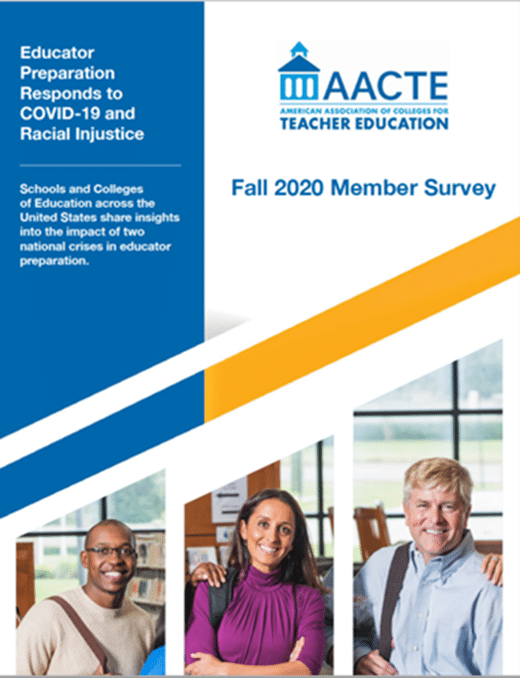 In October 2020, AACTE invited the chief representatives of its member institutions to complete a survey on how the twin crises of COVID-19 and racial injustice had affected their educator preparation programs and how they have responded to these crises. AACTE conducted a similar survey in April 2020, asking members about the immediate impact of COVID-19 on their educator preparation programs. A new report, released during the 2021 Annual Meeting, summarizes results from both surveys, tracking the evolving response of EPPs to these twin crises.
In October 2020, AACTE invited the chief representatives of its member institutions to complete a survey on how the twin crises of COVID-19 and racial injustice had affected their educator preparation programs and how they have responded to these crises. AACTE conducted a similar survey in April 2020, asking members about the immediate impact of COVID-19 on their educator preparation programs. A new report, released during the 2021 Annual Meeting, summarizes results from both surveys, tracking the evolving response of EPPs to these twin crises.
Key findings include the following:
25 Feb2021
By Jacqueline Rodriguez
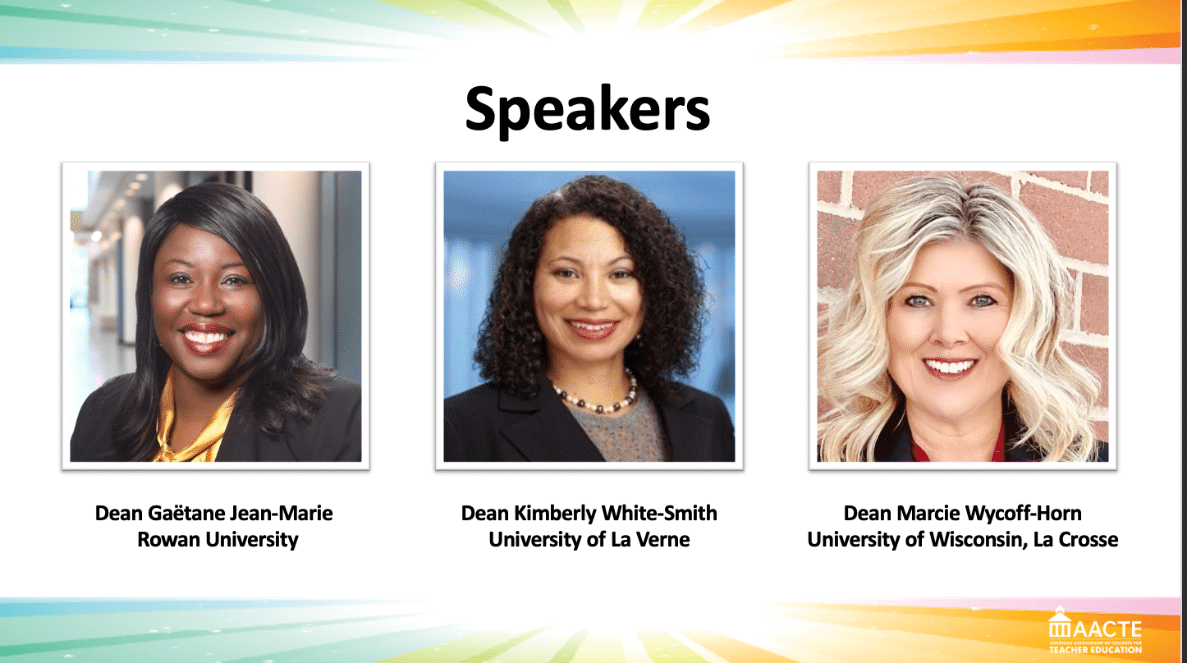
You won’t want to miss AACTE’s next webinar. Join education deans as they discuss how to lean in and lead through the COVID-19 pandemic and the impact of systemic racism on campus and within their communities. Tune into the Leaning in and Leading Through Crisis discussion on March 18 from 2:00 – 3:00 p.m.
25 Feb2021
By Jerrica Thurman
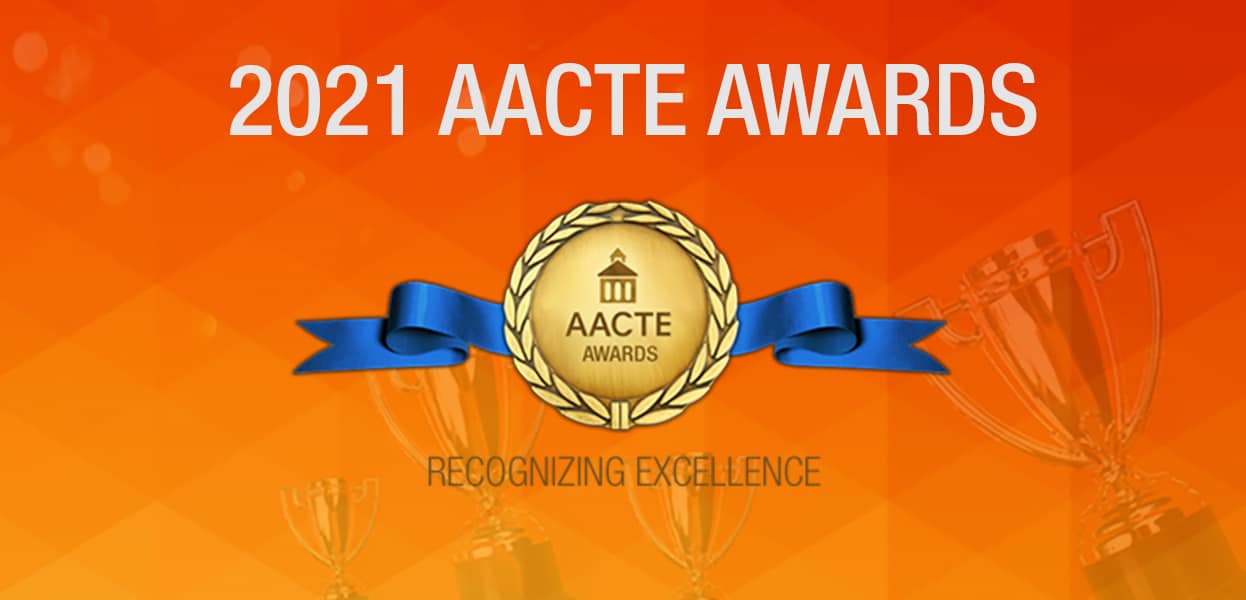 AACTE is pleased to announce the 2021 recipients of its annual awards for innovative research, best practice, and exemplary leadership in educator preparation. The following member institutions and individuals will be honored at the virtual AACTE 73rd Annual Meeting Awards Forum today, 2:45-3:30 p.m.
AACTE is pleased to announce the 2021 recipients of its annual awards for innovative research, best practice, and exemplary leadership in educator preparation. The following member institutions and individuals will be honored at the virtual AACTE 73rd Annual Meeting Awards Forum today, 2:45-3:30 p.m.
25 Feb2021
By Katrina Norfleet
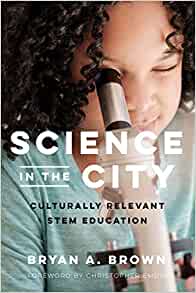 AACTE is pleased to announce Bryan A. Brown’s Science in the City: Culturally Relevant STEM Education, as the recipient of the 2021 AACTE Outstanding Book Award. Brown is being presented with the award at today’s virtual AACTE 73rd Annual Meeting Awards Forum.
AACTE is pleased to announce Bryan A. Brown’s Science in the City: Culturally Relevant STEM Education, as the recipient of the 2021 AACTE Outstanding Book Award. Brown is being presented with the award at today’s virtual AACTE 73rd Annual Meeting Awards Forum.
Science in the City: Culturally Relevant STEM Education, published by Harvard Education Press in 2019, examines how language and culture impact effective science teaching. In the book, Brown argues that teachers need to understand how cultural issues intersect with the fundamental principles of learning, and that science education can thrive if it is connected to students’ culture, backgrounds, identities, and language.
25 Feb2021
By Katrina Norfleet
AACTE is pleased to announce that Teresa Foulger, Kevin Graziano, Denise Schmidt-Crawford and David Slykhuis are the recipients of the 2021 AACTE Edward C. Pomeroy Award for Outstanding Contributions to Teacher Education. The foursome are being recognized for the development of the Teacher Educator Technology Competencies (TETCs) and for their efforts to broadly disseminate the TETCs to teacher educators. The recipients are being presented with the award at today’s virtual AACTE 73rd Annual Meeting Awards Forum.

25 Feb2021
By Katrina Norfleet
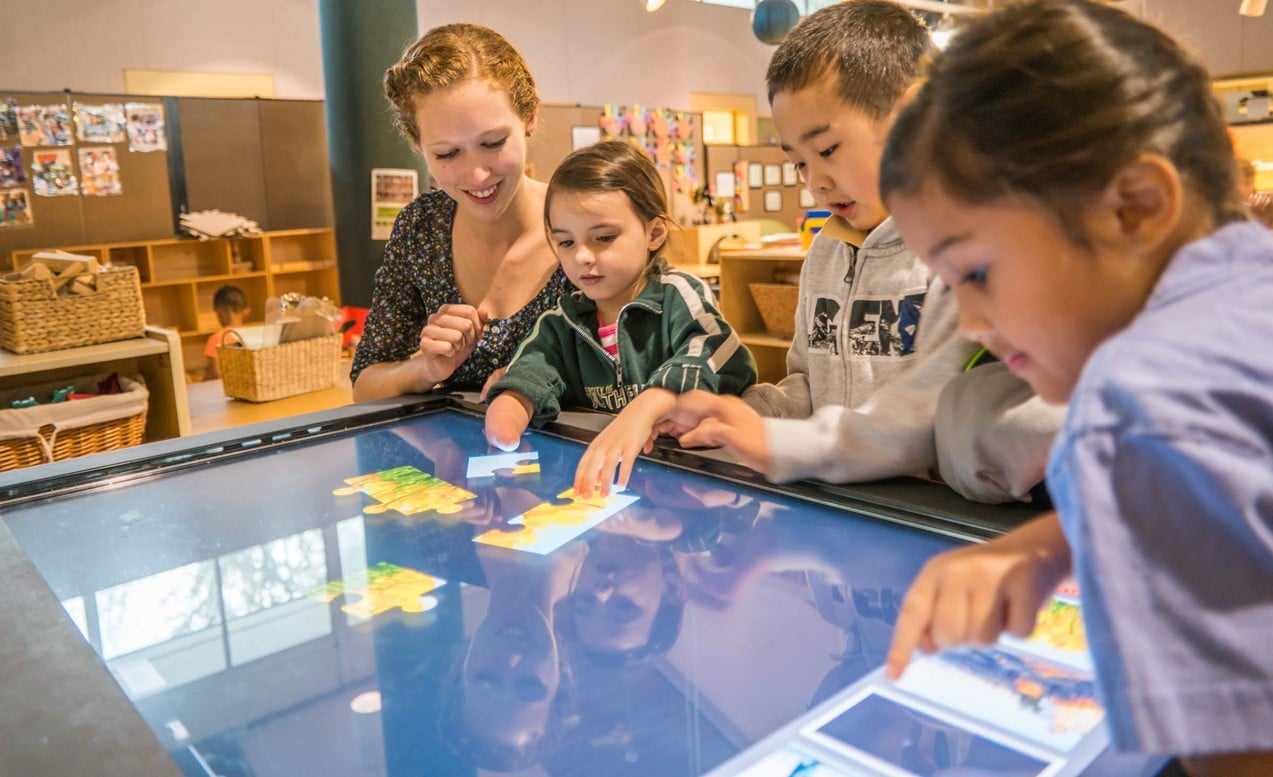
AACTE is pleased to announce the University of South Florida (USF) as the recipient of the 2021 AACTE Best Practice Award for Innovative Use of Technology. Ilene Berson, professor of early childhood at USF, is being presented with the award at today’s virtual AACTE 73rd Annual Meeting Awards Forum.
25 Feb2021
By Katrina Norfleet
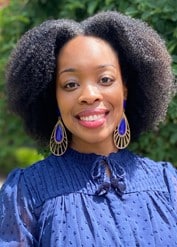 AACTE is pleased to announce Sarah “Mia” Obiwo as the recipient of the 2021 AACTE Outstanding Dissertation Award for “Bringing Clarity to the Construct: A Content Analysis of Disposition for Urban Teaching and Learning.” The author completed her dissertation for the Ph.D. at Georgia State University, and she currently serves as assistant professor of early childhood education at the University of Memphis. She is being presented with the award at today’s virtual AACTE 73rd Annual Meeting Awards Forum.
AACTE is pleased to announce Sarah “Mia” Obiwo as the recipient of the 2021 AACTE Outstanding Dissertation Award for “Bringing Clarity to the Construct: A Content Analysis of Disposition for Urban Teaching and Learning.” The author completed her dissertation for the Ph.D. at Georgia State University, and she currently serves as assistant professor of early childhood education at the University of Memphis. She is being presented with the award at today’s virtual AACTE 73rd Annual Meeting Awards Forum.
25 Feb2021
By Katrina Norfleet

AACTE is pleased to announce authors of the article, “Rethinking High-Leverage Practices in Justice-Oriented Ways,” as the recipient of the 2021 AACTE Outstanding Journal of Teacher Education Article Award. Published in the September/October 2020 issue of the journal, the authors of the article, Angela Calabrese Barton of University of Michigan, Edna Tan of University of North Carolina at Greensboro, and Daniel J. Birmingham of Colorado State University are being presented with the award at today’s virtual AACTE 73rd Annual Meeting Awards Forum.
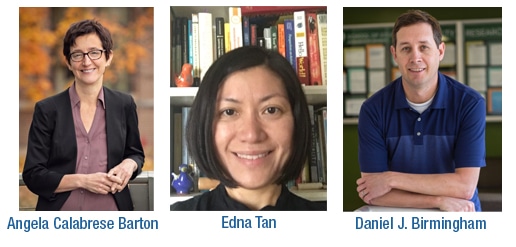
“There is much to admire and value about the scholarship that Calabrese Barton, Tan, and Birmingham report in this award-winning piece,” said Elizabeth Birr Moje, dean of the School of Education, University of Michigan. “Their ambitious pursuit of justice-oriented teaching practice, conducted in partnership with teachers, makes invaluable contributions to our understanding of how educators engage in socially transformative teaching.”
24 Feb2021
By Caitlin Kanaly
Collaboration benefits AACTE member institutions with complimentary access to GoReact’s platform through July and discounted access thereafter.
GoReact and the American Association of Colleges for Teacher Education (AACTE) today announced a joint venture to expand educator preparation programs’ access to video assessment tools. The partnership was announced during AACTE’s 73rd Annual Meeting, the premier event for teacher education.
Through the partnership, AACTE member institutions can receive complimentary access to GoReact’s video assessment platform for a limited time and an ongoing discount thereafter. New GoReact users will receive free access to the platform until July 31, 2021, while existing GoReact users will receive expanded usage rights during the same timeframe. All AACTE members will receive a minimum of 10% discounted pricing following the complimentary service period. More than 175 AACTE member institutions currently use GoReact within their educator preparation programs.
24 Feb2021
By Jerrica Thurman
The 73rd Annual Meeting of the American Association of Colleges for Teacher Education (AACTE) begins today. The conference, themed “Resisting Hate, Restoring Hope: Engaging in Courageous Action,” is being held virtually February 24 – 26. Attendees include deans, faculty, students, and administrators from undergraduate and graduate education programs, community colleges, and PK-12 schools, as well as representatives from state and federal agencies, nonprofit organizations, and foundations.
The past year has presented the educational system with many challenges. The onset of the pandemic, incidents of racial injustice, and the digital divide magnified the systemic challenges occurring in PK-16 environments that serve the nation’s most vulnerable populations—students of color, students with disabilities, students from immigrant families, students from low-income families, and LGBTQ students. Under its 2021 theme, the AACTE conference offers attendees hundreds of concurrent sessions that explore how to revolutionize U.S. educational systems and practices to better serve all learners, dismantle inequities, and assure that no child’s future is determined by their race or socioeconomic background.
23 Feb2021
By Meghan Grenda
AACTE’s new Member Spotlight features an individual from a member institution, highlighting how their work makes a difference in classrooms across the country. Nominate yourself or another member by providing a response to the following questions and sending to mgrenda@aacte.org.
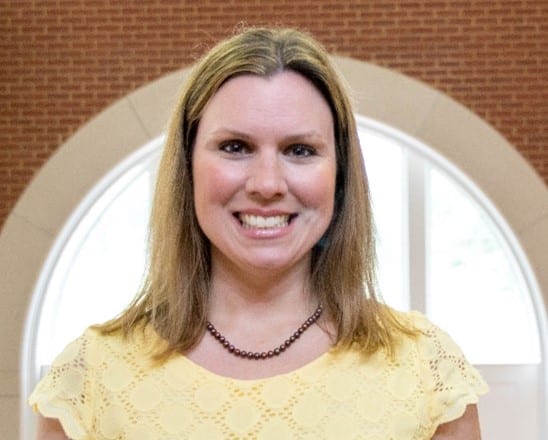 Get to know Teresa Clark …
Get to know Teresa Clark …
Position/Institution: Associate Professor of P-20 and Community Leadership, Murray State University
Number of years in your position: I am in my seventh year at Murray State. I started as an Assistant Professor and was promoted to Associate last summer.
Alma Mater(s): Geneva College (B.A. and M.A.) and Vanderbilt University (Ed.D)
Hometown: I grew up in Beaver, PA, lived in Nashville, TN and now Murray, KY.
23 Feb2021
By Katrina Norfleet
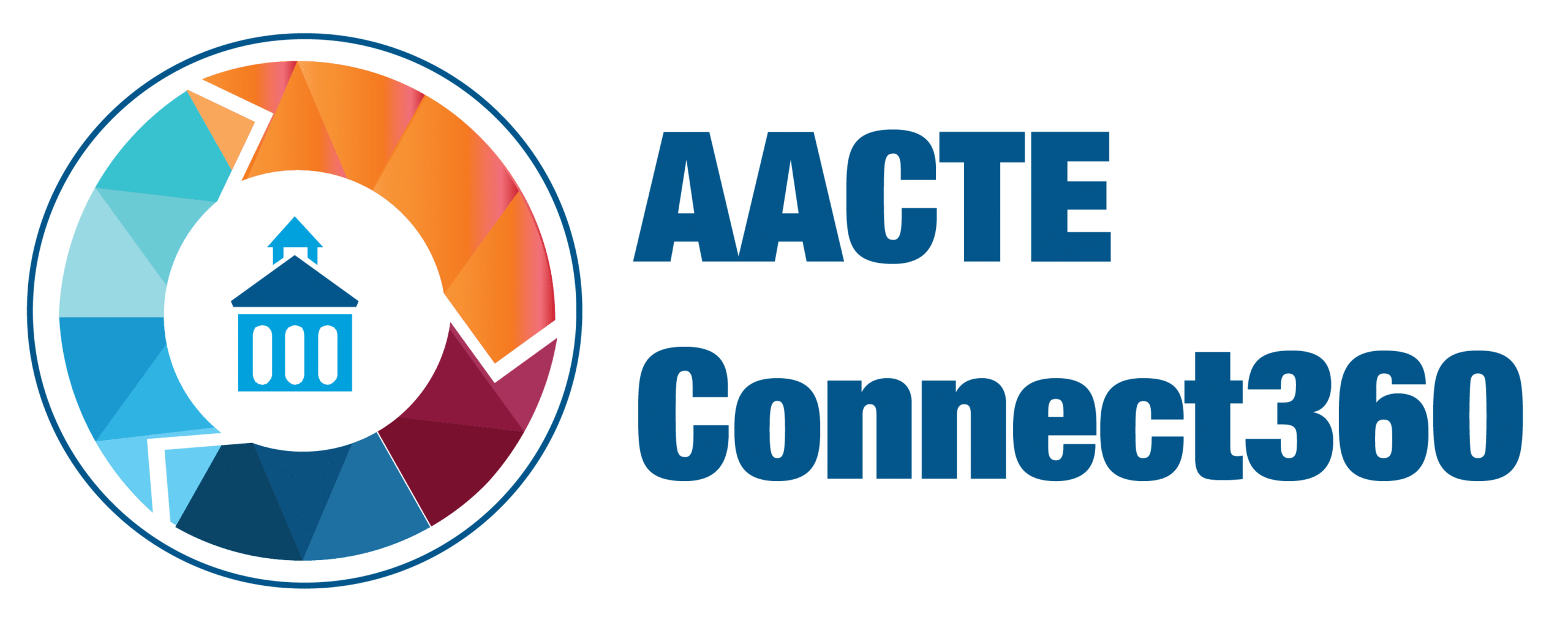 AACTE is in the final stages of launching the AACTE Connect360 online community. This week, Annual Meeting attendees will be among the first to preview and engage with colleagues in the new, members-only platform. As a registered attendee, members can create their profile, introduce themselves, and start or respond to a conversation during the 2021 virtual conference.
AACTE is in the final stages of launching the AACTE Connect360 online community. This week, Annual Meeting attendees will be among the first to preview and engage with colleagues in the new, members-only platform. As a registered attendee, members can create their profile, introduce themselves, and start or respond to a conversation during the 2021 virtual conference.
Attendees are invited to stop by the virtual Conference Community Center on Wednesday, February 24 or Thursday, February 25 for a tutorial on AACTE Connect360, where they can learn more about how to make and maintain professional connections during and after the annual conference. The AACTE team will be available to answer questions and guide members through the digital, collaborative tool. Plus, there will be plenty of opportunities to participate in online discussions with Annual Meeting colleagues over the next few days.
22 Feb2021
By Jerrica Thurman
22 Feb2021
By Jerry Berberet
The Journal for Success in High-Need Schools, is seeking articles and columns for its Volume 16, Number 2, Issue theme – “Education in a Pandemic Age: Evolution or Transformation?”
The COVID-19 pandemic is the latest and by far the most severe of several pandemics (e.g., HIV, SARS, MERS, Ebola) global society has experienced in recent decades. COVID-19 has dramatically affected all sectors of education and society, including teaching and learning; how schools are structured; student, teacher, and parent/family relationships; and has thrust eLearning front and center in all aspects of education. In shuttering virtually all schools and colleges and with nearly all students “sheltering in place,” COVID-19 transformed, at least in the short term, the trajectory of the decades-long evolution of online and distance learning. As teachers scramble to develop their classes online and schools struggle to make technology more widely available, families must adjust to new realities with children at home. Already there are wider impacts on work, leisure, and family life, not to mention jobs, careers, social organization, governance, international relations, and the global economy. The timing and magnitude of these changes are open to speculation, but it appears that at some level they will be long lasting, even as the duration of COVID-19 and the likelihood of future pandemics on our complex, highly interactive Earth society are unclear.
 AACTE announced today Robert E. Floden, Ph.D., of Michigan State University (MI) as the new chair of its Board of Directors. During his one-year term, Floden will support AACTE and its President and CEO Lynn M. Gangone in implementing the Association’s strategic goals, incorporating lessons learned from the pandemic to advance educator preparation and policies, and growing AACTE’s diversity, equity, and inclusion initiatives.
AACTE announced today Robert E. Floden, Ph.D., of Michigan State University (MI) as the new chair of its Board of Directors. During his one-year term, Floden will support AACTE and its President and CEO Lynn M. Gangone in implementing the Association’s strategic goals, incorporating lessons learned from the pandemic to advance educator preparation and policies, and growing AACTE’s diversity, equity, and inclusion initiatives.

 In October 2020, AACTE invited the chief representatives of its member institutions to complete a survey on how the twin crises of COVID-19 and racial injustice had affected their educator preparation programs and how they have responded to these crises. AACTE conducted a similar survey in April 2020, asking members about the immediate impact of COVID-19 on their educator preparation programs. A new
In October 2020, AACTE invited the chief representatives of its member institutions to complete a survey on how the twin crises of COVID-19 and racial injustice had affected their educator preparation programs and how they have responded to these crises. AACTE conducted a similar survey in April 2020, asking members about the immediate impact of COVID-19 on their educator preparation programs. A new 
 AACTE is pleased to announce the 2021 recipients of its annual awards for innovative research, best practice, and exemplary leadership in educator preparation. The following member institutions and individuals will be honored at the virtual
AACTE is pleased to announce the 2021 recipients of its annual awards for innovative research, best practice, and exemplary leadership in educator preparation. The following member institutions and individuals will be honored at the virtual  AACTE is pleased to announce Bryan A. Brown’s Science in the City: Culturally Relevant STEM Education, as the recipient of the 2021 AACTE Outstanding Book Award. Brown is being presented with the award at today’s virtual AACTE 73rd Annual Meeting Awards Forum.
AACTE is pleased to announce Bryan A. Brown’s Science in the City: Culturally Relevant STEM Education, as the recipient of the 2021 AACTE Outstanding Book Award. Brown is being presented with the award at today’s virtual AACTE 73rd Annual Meeting Awards Forum.

 AACTE is pleased to announce Sarah “Mia” Obiwo as the recipient of the 2021 AACTE Outstanding Dissertation Award for “Bringing Clarity to the Construct: A Content Analysis of Disposition for Urban Teaching and Learning.” The author completed her dissertation for the Ph.D. at Georgia State University, and she currently serves as assistant professor of early childhood education at the University of Memphis. She is being presented with the award at today’s virtual AACTE 73rd Annual Meeting Awards Forum.
AACTE is pleased to announce Sarah “Mia” Obiwo as the recipient of the 2021 AACTE Outstanding Dissertation Award for “Bringing Clarity to the Construct: A Content Analysis of Disposition for Urban Teaching and Learning.” The author completed her dissertation for the Ph.D. at Georgia State University, and she currently serves as assistant professor of early childhood education at the University of Memphis. She is being presented with the award at today’s virtual AACTE 73rd Annual Meeting Awards Forum.

 Get to know Teresa Clark …
Get to know Teresa Clark … AACTE is in the final stages of launching the
AACTE is in the final stages of launching the